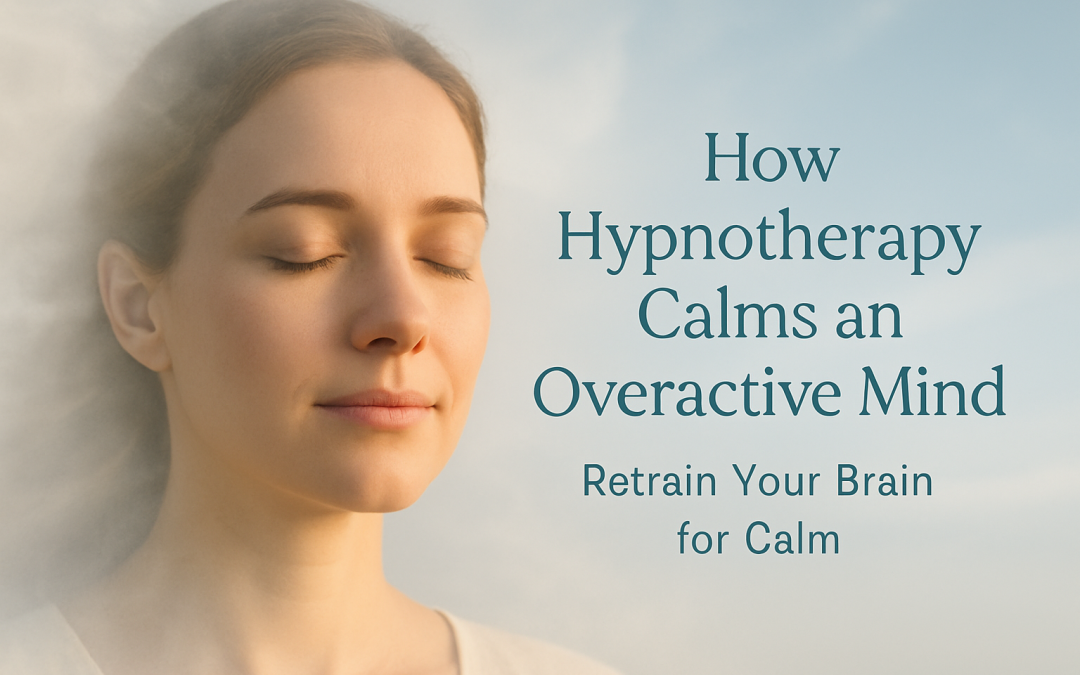If you’ve ever wished you could just switch off your thoughts for five minutes, you’re not alone.
For many people struggling with anxiety, overthinking can feel like a constant background hum that never stops. You try to relax, but your mind keeps jumping from one worry to the next — replaying the past, predicting the worst, and asking “what if?” over and over again.
It can be exhausting.
The good news is, an overactive mind isn’t a life sentence — it’s a habit your brain has learned over time. And like any habit, it can be changed.
That’s where hypnotherapy comes in.
When Your Mind Won’t Switch Off
Overthinking is your mind’s way of trying to protect you. It’s constantly scanning for problems, looking for danger, and trying to make sense of everything. In small doses, that’s useful — but when it runs on overdrive, it triggers your body’s stress response again and again.
The result?
Your nervous system stays stuck in “fight or flight,” even when you’re safe.
That’s why your shoulders feel tense, your heart races, and you can’t sleep. Your body is responding to thoughts as if they were real threats.
And here’s the interesting part:
You can’t “think” your way out of overthinking.
The conscious mind — the logical part of you — is the same part that’s trying to solve the problem. What you need is a way to reach the deeper, calmer part of your mind — the part that actually controls those automatic responses.
That’s exactly what hypnotherapy helps you do.
How Hypnotherapy Brings Calm
Hypnotherapy works by helping your mind enter a deeply relaxed, focused state — a little like that moment before you drift off to sleep, or when you’re so absorbed in a film that you forget about the world around you.
In that state, your brain waves slow down from the fast, busy beta state (where overthinking lives) into the calmer alpha and theta states.
This is where your nervous system can reset, and your subconscious mind becomes more receptive to new, calming suggestions.
Here’s what actually happens during that process:
- Your body relaxes first.
Gentle breathing and guided relaxation help lower your heart rate, release muscle tension, and tell your brain, “It’s safe to relax.” - Your mind follows.
As your body calms, your thoughts begin to slow naturally. You start to observe them rather than chase them. - Your subconscious listens.
In this calm, focused state, the mind becomes more open to positive change. We can help it release the need to “control everything” and teach it to feel safe without constant worry. - You rehearse calm.
Through guided visualisation, you mentally practise feeling calm and confident in situations that normally trigger anxiety. The more you rehearse it, the stronger that calm response becomes.
Hypnotherapy doesn’t “erase” your thoughts — it simply teaches your mind a different rhythm. Instead of chaos and chatter, you experience stillness and balance.
Rewiring the Anxious Brain
Your brain is incredibly adaptable.
When you think the same anxious thoughts repeatedly, you strengthen those neural pathways — like carving deeper grooves in a record.
Hypnotherapy helps create new grooves.
By repeatedly guiding your mind into a calm, relaxed state, you build new neural connections linked to safety and ease. Over time, those become your brain’s default setting — so it takes less effort to feel calm, and more effort to feel anxious.
In other words, calm becomes your new normal.
What Clients Often Say
Many of my clients come to me saying things like:
“My mind never shuts up.”
“I can’t stop worrying, even when I know there’s nothing wrong.”
“I wake up already feeling anxious.”
After just a few sessions, the comments often shift to:
“I feel lighter — like there’s space in my head again.”
“I notice my thoughts, but they don’t control me anymore.”
“I finally slept through the night!”
That’s because hypnotherapy doesn’t just calm you during the session — it teaches your mind what calm feels like again, so it can recreate that state naturally in daily life.
What You’ll Experience in a Session
If you haven’t read it yet, I go into detail about what actually happens in your first session in my post:
What to Expect in Your First Hypnotherapy Session.
But in short:
A typical session feels relaxing, safe, and personal to you.
You’ll remain aware throughout — you can talk, move, or open your eyes at any time.
We might use gentle breathing exercises, guided imagery, or techniques that help you “step out” of anxious thoughts and reframe them from a calm perspective.
It’s not about losing control — it’s about finally feeling back in control.
The Science Behind the Calm
When your mind relaxes under hypnosis, your body releases less adrenaline and cortisol (the stress hormones).
Meanwhile, the parasympathetic nervous system — your body’s natural “calm switch” — switches on.
That’s why hypnotherapy often leads to better sleep, steadier moods, improved focus, and even fewer physical symptoms of anxiety like stomach tension or headaches.
You’re not forcing calm — you’re activating it.
A Calmer Mind Is Within Reach
If your mind feels like it’s constantly in overdrive, know this:
It’s not a character flaw.
You’re not “broken” or “weak.”
Your mind has simply learned to overprotect you — and with the right guidance, it can learn to relax again.
Hypnotherapy gives you the tools to press pause, breathe, and retrain your mind for calm.
And once you’ve felt that shift, you’ll never forget what calm truly feels like.
Ready to Give Your Mind a Break?
If anxiety and overthinking have been running your life lately, why not take the first step toward calm today?
I offer a free telephone anxiety assessment — a friendly, no-pressure chat to talk about what’s been happening and how hypnotherapy can help.
Message me on WhatsApp: +44 7822 011452
Let’s quiet the noise, retrain your mind, and help you feel calm and confident again.


Recent Comments